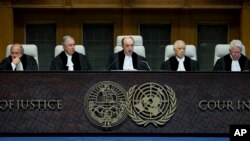The top U.N. court ruled Tuesday that neither Croatia nor Serbia committed genocide during the 1990s Balkan wars, when Croatia broke away from Yugoslavia.
According to a ruling read by Judge Peter Tomka, president of the International Court of Justice (ICJ), many crimes had been committed by the two countries' forces, but both sides failed to prove the other committed genocide during the conflict, which killed over 20,000 people.
“What is generally called ethnic cleansing does not constitute genocide,” Tomka said at the court's Hague headquarters. “Acts of ethnic cleansing may be part of a genocidal plan, but only if there is an intention to physically destroy the target group.”
But, he added, "The court encourages the parties to continue their cooperation with a view to offering appropriate reparation to the victims of such violations, thus consolidating peace and stability in the region."
The cases were part of the long legal fall-out from the break-up of Yugoslavia into seven states in wars that lasted eight years and left more than 130,000 dead in Europe's worst conflagration since World War II.
Croatia took Serbia to the court in 1999, claiming that large numbers of Croats were killed, tortured, displaced or put in detention centers after Serb militias and Yugoslav army troops took over the city of Vukovar and surrounding areas.
Cases filed
In 2010, Serbia hit back with an ICJ suit of its own, claiming over 200,000 Serbs were expelled during a Croatian counteroffensive during one of the conflict's final battles in 1995.
The panel of judges rejected Croatia's claim 15-2. Serbia's counterclaim was rejected unanimously, implying that even Serbia's delegated judge had ruled against.
Both countries have said they will accept the ruling of the ICJ, which is meant to settle disputes between states. But there was concern that the ruling may spark political tensions.
On Sunday, Serbian Foreign Minister Ivica Dacic said the ruling "will be one of perhaps the most important events for our bilateral relations with Croatia."
"It will probably be the end of a process that has lasted for 15 to 20 years [and] will put an end to both sides' fight to prove who the worst criminal is," he said.
Genocide is the most serious of international crimes but also the hardest to prove. The ICJ, which rules in disputes between states, has recognized only one genocide case since opening its doors in 1946.
In 2007 the court ruled that genocide had taken place in 1995, at Srebrenica in neighboring Bosnia, when almost 8,000 Muslim men and boys were slaughtered and their bodies dumped in mass graves by Bosnian Serb troops that overran a U.N.-protected enclave.
Some material for this report came from Reuters and AFP.






